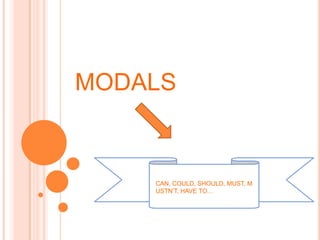
cindy1999
- 1. MODALS CAN, COULD, SHOULD, MUST, M USTN’T, HAVE TO…
- 2. GRAMMAR •MODAL “ can”and “can´t” •We use can to express ability, possibility and permission and to make a request. •Examples: Can you write a text message and talk at the same time? I can jump high!”(ability) "Can I go to the toilet, please?"(request) "You can´t eat in the canteen" (possibility/permission)
- 3. Modal “could”and “couldn´t” •We use could to express ability in the past, possibility and to make a request. •Examples: The phone´s ringing. It could be Ben. Could you use a mobile phone when you were ten? He couldn´t remember the times of meeting. She couldn´t do her homework.
- 4. MODAL “SHOULD” AND “SHOULDN´T” •We use should to give advice. •Examples: We should leave a message We shouldn´t own a mobile phone. Should we leave a message? •They should go to school.
- 5. MODAL “ MUST” AND “HAVE TO” •We use must and have to to express obligation. •Examples: •You must go to school. •You have to do your homework. •You must go to bed early •Does he have to study hard?
- 6. MODAL “MUSTN´T” •We use mustn´t to express prohibition. •Examples: •You mustn´t use your mobile phone. •He mustn´t go anywhere. •You mustn´t walk alone on the street.
- 7. MODAL “MAY” •We use may to show possibility in the future, to ask for and give or deny permission in formal speech. •Examples: •I may have enough money to go to the cinema. •May i use your phone? •You may not use your phone here. •You may have other things to do.
- 8. MODAL “MIGHT” •We use might to express ability in the past, possibility and to make requests. •Examples: I might be late for my maths test. We might go to the shopping center. I might have a shower after school. Caution: don´t use might for question.
- 9. EXERCISES INSERT THE CORRECT MODAL 1.I have no time. I ………. leave now or I will miss the bus. 2.I wish I ……… buy a new mobile phone but I don't have enough money. 3.She looks tired; she ……….. take some days off. 4.Judy is not at home. She ……… have gone to Madrid, I don't know. 5. ……….we go out tonight, please? Yes, but you ………. be late. 6. I haven't decided yet where I will go in my next holidays. I think I ……… go to Paris. 7. ……. you speak German? No, I …….. . 8. I ………call home.
- 10. ANSWERS 1.I have no time. I must leave now or I will miss the bus. 2.I wish I could buy a new mobile phone but I don't have enough money. 3. She looks tired; she should take some days off. 4. Judy is not at home. She might have gone to Madrid, I don't know. 5.May we go out tonight, please? Yes, but you mustn´t be late. 6.I haven't decided yet where I will go in my next holidays. I think I might go to Paris. 7.Can you speak German? No, I can´t. 8. I have to call home.
